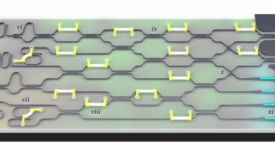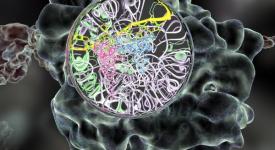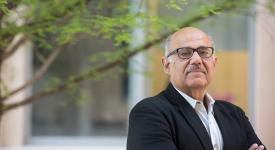Chandrajit Bajaj
New Materials Could Lead to Computers That Work Like the Human Brain

09/14/2021 - For decades, computer chips have gotten denser, faster and more energy efficient. But in recent years, those improvements have slowed to a crawl.Yet some of the most exciting new applications engineers are exploring — self-driving cars, microscopic robots to diagnose and treat diseases inside the human body, and systems collecting environmental data for battlefield awareness or public health forecasting — need fast, compact, energy-efficient computer chips that can be integrated directly into these systems, rather than relying on connecting to supercomputers far away.
Changing the Future of Gene-Editing

03/06/2019 - Gene-editing or genome engineering is the altering of DNA within a living organism. Once believed to be far-fetched and unthinkable, it is becoming more and more common due to scientific breakthrough techniques like CRISPR. What most people don’t know though is the use of computing tools in conjunction with CRISPR make gene-editing as efficient and mistake-free as possible—making it a viable cure to deadly genetic diseases.
Chandrajit Bajaj Selected as SIAM Fellow
04/01/2016 - Chandrajit Bajaj has been selected as a Fellow of the Society for Industrial and Applied Mathematics (SIAM) "for fundamental contributions to applied mathematics algorithms in geometric modeling, imaging science, bioinformatics, and data visualization." SIAM Fellows are designated each year to recognize members of the community for their distinguished contributions to the disciplines of applied mathematics, computational science and related fields.
Computer Science vs. Cancer: How Precision Medicine is Turning the Tables on Cancer
11/03/2015 - There are few things as full of anxiety, heartbreak, and anguish as finding out that you or someone you love has cancer. Unfortunately, it’s not at all uncommon. By the American Cancer Society’s estimates it is expected that in the year 2015 alone, there will be 1.6 million new cancer diagnoses and nearly 600,000 deaths—or roughly 1,600 people every day. But statistics are hardly necessary to realize the enormity of the problem. So far, the road to a cure has been long and complicated and with what’s seemed like no end in sight—until recently.
Chandrajit Bajaj and Inderjit Dhillon Elected IEEE Fellows
11/25/2013 - Two of our distinguished faculty, Chandra Bajaj and Inderjit Dhillon, have been elected IEEE Fellows.
Gates Opens Building, Talks Health
03/07/2013 - In a speech Wednesday to an audience of computer science students, Bill Gates, Microsoft founder and co-chair of the Bill & Melinda Gates Foundation, offered his vision of how the computing revolution will dramatically improve human well-being in the next few decades.
Computer Science Combats Disease
07/25/2012 - By David Maly, The Daily Texan, 7/18/2012
Univ. of Texas group speeds up drug discovery with supercomputers
05/30/2012 - FierceBiotechIT | By Ryan McBride For years, drug researchers have tapped computers to take serendipity out of the discovery equation, and a group from the University of Texas at Austin has advanced computational drug discovery further with updated image-reconstruction and modeling techniques, according to the university.




